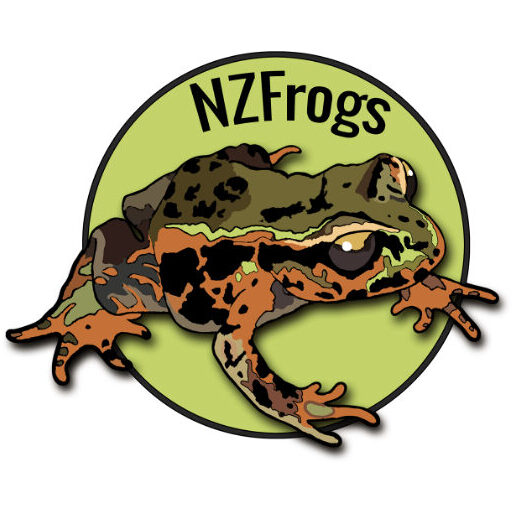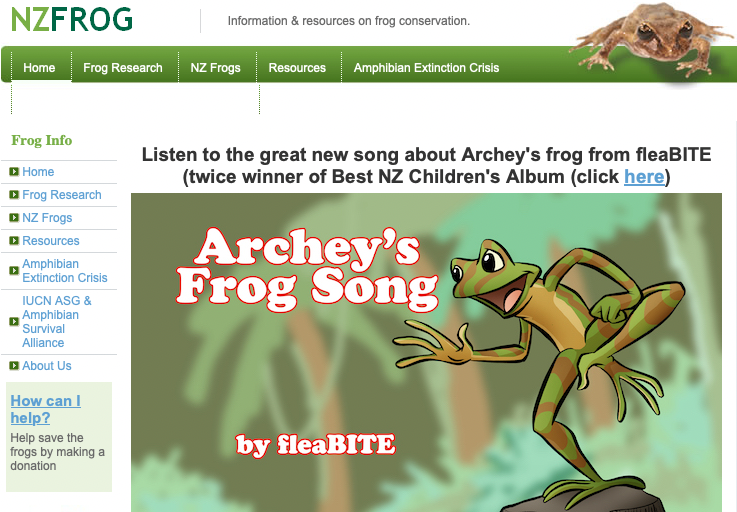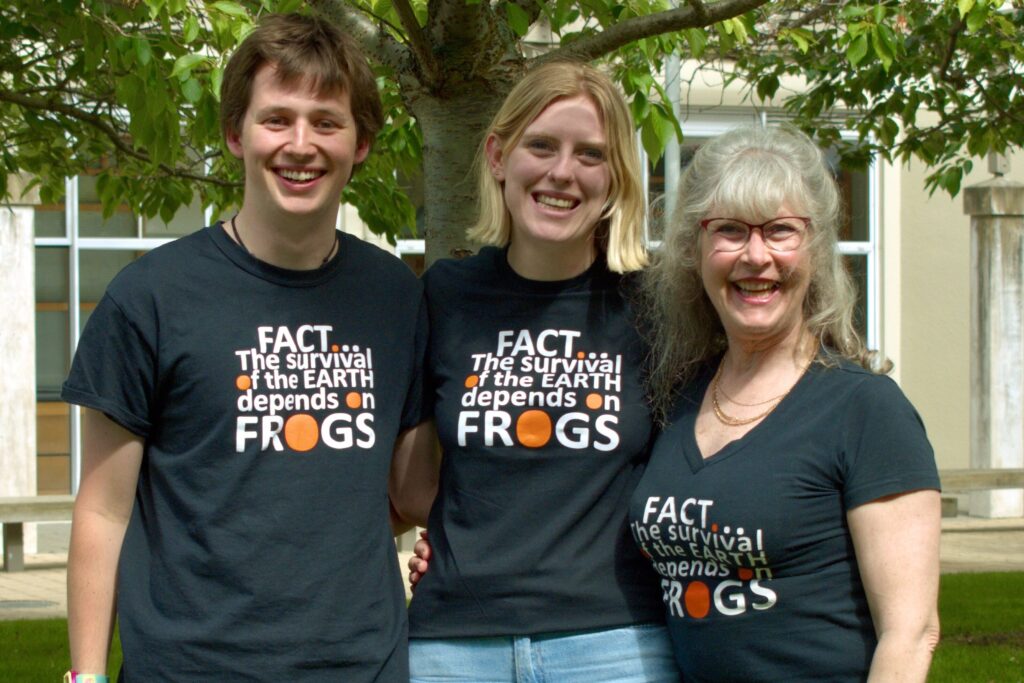
Originally launched in 2007, the NZFrogs website aimed to provide information and resources, supporting research awareness and conservation for New Zealand’s native frogs. NZFrogs became a charity in 2023 which was accompanied with a website refresh. The new website will continue providing updated information and resources. We will also be reinstating frog of the week which is a continuation of @AmphibianPhil frog of the week #FrogOTW. The NZFrogs team is very excited to embark on this journey as a charity and we hope you enjoy our refreshed website.
Contact the NZFrogs team by clicking here
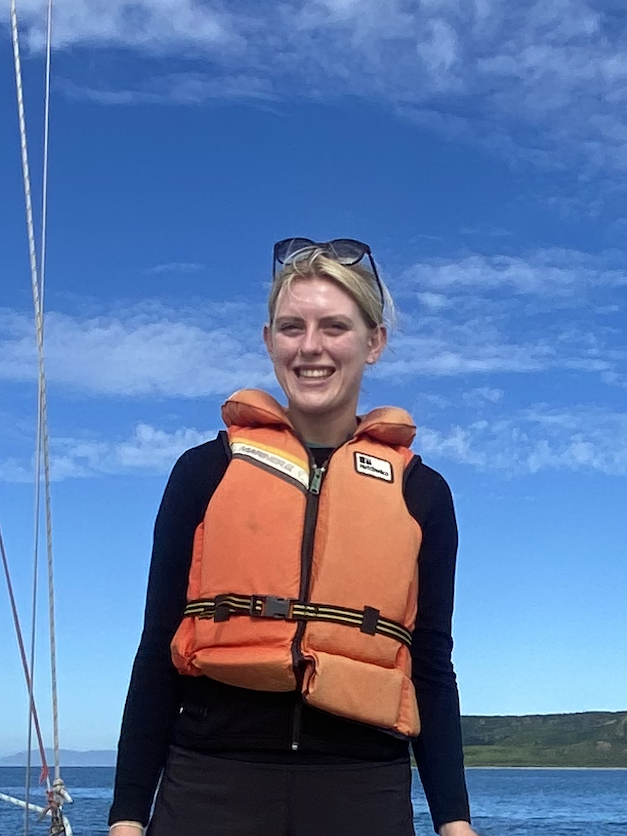
Tobia Dale – Chair
Having fond childhood memories of Australian frogs which would visit her nana’s garden, Tobia was shocked to learn New Zealand had its very own native frogs. Currently her Master of Science in Zoology is exploring where Leiopelma used to live and could live in the future. Tobia took on the responsibility of NZFrogs after Phil’s passing. Tobia has also been a BLAKE ambassador, worked as a freelance writer for the Forest and Birds children magazine and worked at Te Papa as a lab technician. Her hope is the refreshed NZFrogs website will increase public awareness of amphibians… particularly New Zealand’s native frogs.
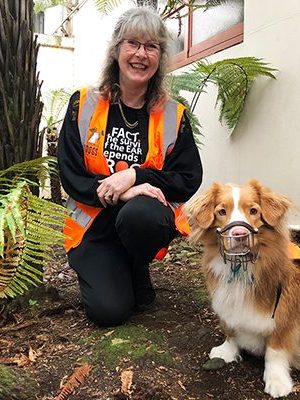
Debbie Bishop – Treasurer
Debbie has an incredible wealth of amphibian knowledge and was the IUCN SSC Amphibian Specialist Group Administrator from 2016 to 2020. She continues to play an active role protecting New Zealand native frogs as Holly the frog dog’s handler. Debbie began working with frogs in 1985 as a field research assistant for her husband Phil Bishop, a job which took her all over the world. Although her background has been in printing and advertising, administration and audiometry, her passion for wildlife conservation and the outdoors is paramount.
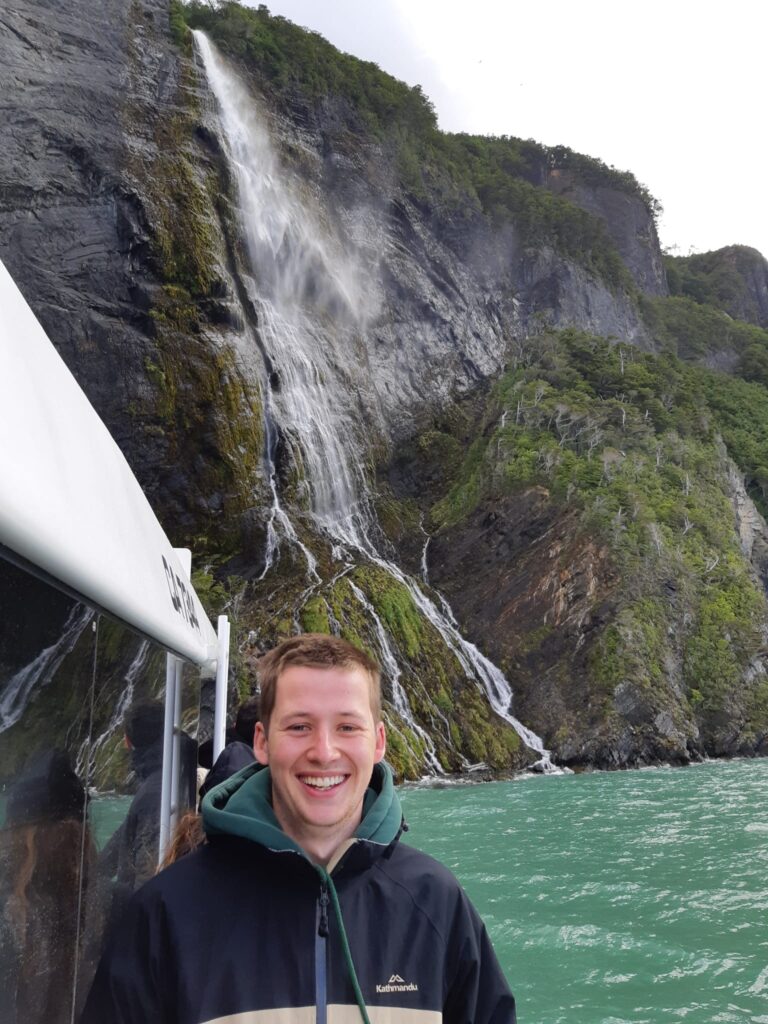
Hadley Muller – Secretary
Hadley’s passion for New Zealand’s native animals and their conservation which was sparked exploring the Beech forests of Arthur’s Pass. Currently he is studying towards a Master of Science in Zoology focusing on Leiopelma frogs. Outside of his studies, Hadley spent a year living in Chile and is fluent in Spanish. He was a 2023/24 Blake ambassador and has previously worked in research, looking at weevils. Hadley’s studies and passion for conservation lead to him to volunteer for NZFrogs. He hopes NZFrogs can enable everybody to enjoy some of New Zealand’s most special taonga.
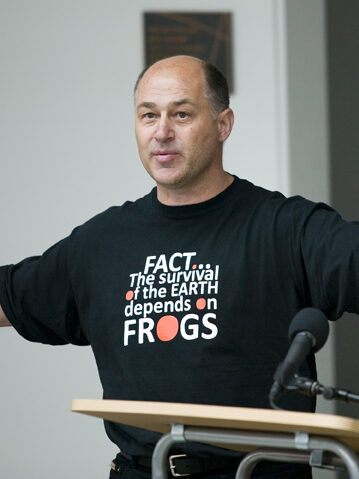
Phil Bishop
Phil co-founded and led the NZFROG research group at the Otago University Zoology Department and ran the original NZFrogs website. He had a keen interest in amphibians from a young age which continued into a flourishing career. He shared his infectious passion for the conservation of amphibians with anyone who would listen. At one point Phil was a Lecturer, a Professor and the Director of Ecology in the Department of Zoology at the University of Otago, Chief Scientist for the global IUCN SSC Amphibian Survival Alliance and the Co-Chair of the IUCN SSC Amphibian Specialist Group, as well as being instrumental in the production of the Native frog (Leiopelma spp.) recovery plan, 2013-2018 when part of the New Zealand Native Frog Recovery Group. He worked on amphibian behaviour and conservation for over 30 years, publishing over 80 scientific papers. Phil was a charismatic wildlife warrior who worked tirelessly on amphibian conservation on both the national and international stage. He was an inspiration to many and sadly passed at the beginning of 2021. His presence within the amphibian research community is thoroughly missed.
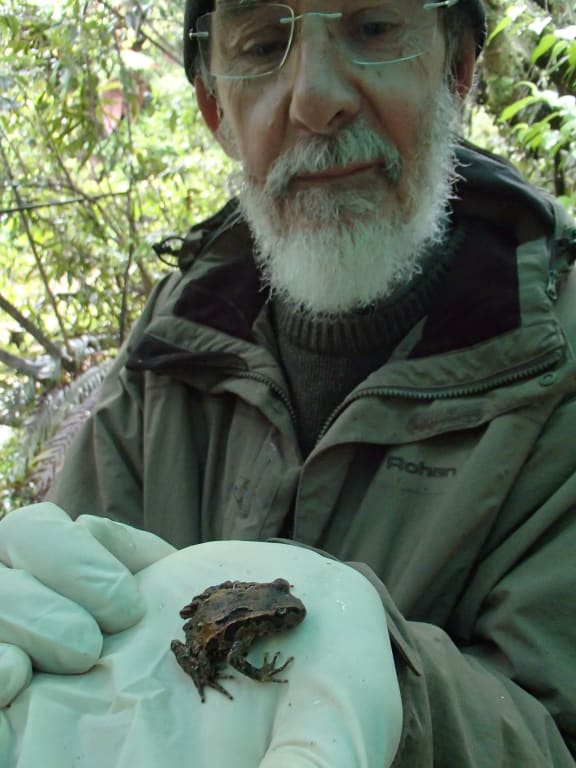
Ben Bell
Ben led the Victoria University of Wellington NZFROG research group which he co-founded. He has been a pivotal researcher within native and introduced New Zealand frog research. Since the early 1980s, Ben has carried out long-term population studies of Archey’s frog (Leiopelma archeyi) in the Coromandel Ranges and of Hamilton’s frog (L. hamiltoni) on Maud Island, contributing to their ongoing conservation management and revealing their remarkable demography and longevity. He has served on the Department of Conservation’s Frog Recovery Group since its inception. At Victoria University he was first Director of the Centre for Biodiversity & Restoration Ecology and remains an Adjunct Professor there, after his retirement in 2012. Image credit to RNZ / Alison Ballance
The history of NZFrogs
In 2006 the two main university centres contributing to frog research, advocacy, and conservation in New Zealand came together to form NZFROG (New Zealand Frog Research Group). The University of Otago frog research group in Dunedin, was led by Professor Phil Bishop. He had an incredible team of staff and post-graduate students who studied conservation, disease, behaviour and communication of New Zealand frogs.
The second research centre was at Victoria University of Wellington which was led by Associate Professor Ben Bell. He and his team of students studied biology and population dynamics of native frogs through the long-term monitoring of Archey’s frog in the Coromandel and Hamilton’s frog on Maud Island for many years.
Shortly after the formation of NZFROG, Phil Bishop launched the original NZFrogs website in preparation for the 2007 Year of the Frog. The aims of the original NZFrogs website that we continue to follow are;
- To create a more collegial relationship between all frog researchers in New Zealand to ensure researchers maximise use of resources (avoiding repetition of projects).
- To create a one-stop-shop for the public providing all the information they could possibly want to know about New Zealand frogs.
Following the passing of Phil Bishop in 2021 the NZFrogs website remained active due to the generosity of Jane and Patrick Kennelly. However, research on New Zealand frogs continued to be published by students and researchers throughout the country and the website needed an update. In August 2023, NZfrogs became a Charitable Trust and soon after the website relaunched, refreshed with additional and updated information. This refresh was in an effort to re-establish a collaborative research network throughout the country and increase public education and engagement with New Zealand’s frogs.
The new NZFrogs website is now live. We have saved our previous website on the WayBackMachine so you can see how far we’ve progressed since 2007!
Time capsule of NZFrogs Website
Special Thanks
The NZFrogs team would like to thank everybody who has shown support for our cause. We would like to give an extra special thanks to the following:
Jane and Patrick Kennelly for their generosity in supporting the NZFrogs website since its inception with the late Emeritus Professor Phil Bishop and since his passing with Debbie Bishop. Assisting financially with the running costs of the website over the years and sponsoring the initial production of the iconic FACT T-shirts and subsequent additional top ups. Debbie will be forever grateful and is extremely appreciative of this unwavering support, as without it the continuation of the NZFrogs website would not have been possible, thank you so much.
Gino Acevedo who kindly gave up some of his very precious time to create our very own NZFrogs logo for the website. Gino is an extremely talented man and the team at NZFrogs cannot thank him enough for producing such an iconic logo for NZFrogs. We are very grateful and appreciative of your help at the start of our new refreshed website journey.
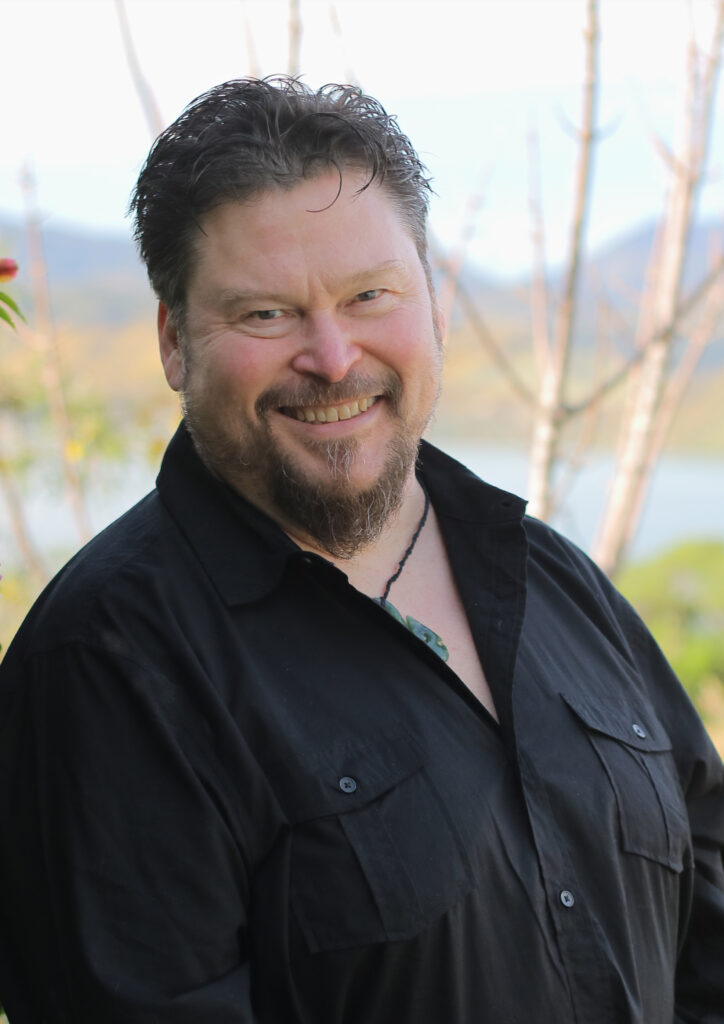
Contact Information
You can contact the NZfrogs team using enquiries@nzfrogs.org
Have you seen a frog?
Report your sighting with photo here or on iNaturalist NZ
Copyright
This website is the copyright of NZFrogs, all rights reserved. The information on this website has been posted with the objective of it being readily available for personal, academic and other educational purposes to increase the knowledge about the importance of New Zealand amphibians. Data should not be used for any commercial purposes. Conditions for reproduction of information include:
- The information, graphics, and materials on this website are not modified;
- Users must personally ensure accuracy of all information, graphics, and materials before use;
- NZFrogs is identified as the source of the information;
- All photos, videos, sound-clips and other information has been provided by members of NZFrogs, unless otherwise stated.
